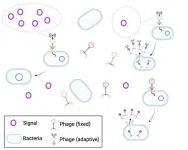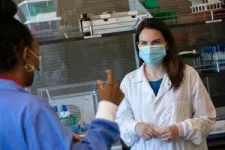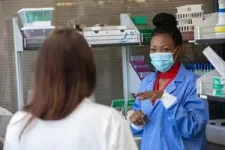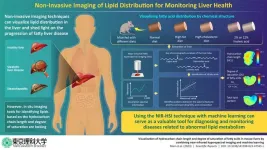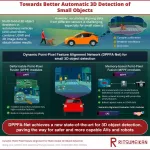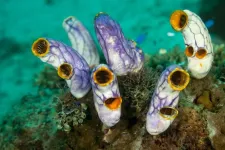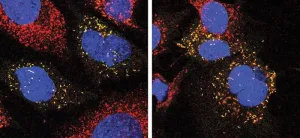(Press-News.org) Phages, the viruses that infect bacteria, will pay a high growth-rate cost to access environmental information that can help them choose which lifecycle to pursue, according to a study. Yigal Meir and colleagues developed a model of a bacteria-phage system to investigate how much the viruses should be willing to invest to acquire information about their local environment. A temperate phage, once inside a bacterium, can choose one of two life cycles. In the lytic cycle, the phage turns the bacterium into a factory for additional phages, until the cell is full of phages and the bacterium bursts and dies. In the lysogenic cycle, the phage inserts its DNA into the bacterial genome. This lysogenic strategy is useful for situations where there are few proximate infection opportunities, either because there are few bacteria nearby or because all nearby bacteria are already infected with related phages. Once phage DNA is inserted into the bacterium, its progeny will also carry phage DNA, and can produce phages in the future when there are more uninfected targets available. Knowing the extent of infection opportunities can determine which lifecycle would lead to more descendants of the phage in the long run. Some phages do have means of sensing the abundance of bacteria nearby, as well as the abundance of phage infection events nearby—but these sensing abilities require genes that come at a cost to the phage. The authors theoretically investigate the “price,” in terms of lysogenic growth rate or number of phages released per burst, that phage should be willing to pay to gain environmental information. According to the authors, a lysogenic phage that has incurred a 50% growth rate penalty to access environmental information will still outcompete a phage that does not sense the abundance of nearby phages or bacteria.
END
The value of information gathering for phages
2024-01-09
ELSE PRESS RELEASES FROM THIS DATE:
Protecting newborns: Research lays the groundwork for a lifesaving vaccine
2024-01-09
BINGHAMTON, N.Y. -- Researchers from Binghamton University, State University of New York are unraveling the workings of Group B Strep (GBS) infections in pregnant women, which could someday lead to a vaccine.
One in five pregnant women carry Streptococcus agalactiae (Group B Strep or GBS) in the vaginal tract, which is typically harmless — except when it isn’t.
The bacterial infection poses serious and even fatal consequences for newborns, including pneumonia, sepsis and meningitis, which can have long-term effects on the child’s cognitive function.
Researchers ...
New study unveils machine learning-aided non-invasive imaging for rapid liver fat visualization
2024-01-09
Steatotic liver disease (SLD), previously known as non-alcoholic fatty liver disease, which includes a range of conditions caused by fat build-up in the liver due to abnormal lipid metabolism, affects about 25% of the population worldwide, making it the most common liver disorder. Often referred to as “silent liver disease,” SLD progresses without noticeable symptoms and can lead to more severe conditions like cirrhosis (liver scarring) and liver cancer.
A liver biopsy—an invasive procedure involving liver tissue sample extraction from the body—is ...
Towards more accurate 3D object detection for robots and self-driving cars
2024-01-09
Robotics and autonomous vehicles are among the most rapidly growing domains in the technological landscape, with the potential to make work and transportation safer and more efficient. Since both robots and self-driving cars need to accurately perceive their surroundings, 3D object detection methods are an active area of study. Most 3D object detection methods employ LiDAR sensors to create 3D point clouds of their environment. Simply put, LiDAR sensors use laser beams to rapidly scan and measure the ...
How fruit bats got a sweet tooth without sour health
2024-01-09
Levi Gadye, 628-399-1046
Levi.Gadye@ucsf.edu | @UCSF
Video: https://ucsf.app.box.com/s/i3atd54ye4m1z1spi0qf59axq7tq7640
Subscribe to UCSF News
A high-sugar diet is bad news for humans, leading to diabetes, obesity and even cancer. Yet fruit bats survive and even thrive by eating up to twice their body weight in sugary fruit every day.
Now, UC San Francisco scientists have discovered how fruit bats may have evolved to consume so much sugar, with potential implications for the 37 million Americans with diabetes. The findings, published on Tuesday, Jan. 9, 2024 in Nature Communications, point to adaptations ...
Vaccine demonstrates potential in delaying relapse of KRAS-mutated pancreatic and colorectal cancers
2024-01-09
HOUSTON ― A vaccine showed potential to prevent relapse of KRAS-mutated pancreatic and colorectal cancers for patients who had previously undergone surgery, according to a Phase I trial led by researchers at The University of Texas MD Anderson Cancer Center. Results were published today in Nature Medicine.
In the trial, patients with pancreatic and colorectal cancer who were considered at high risk of relapse received a maximum of 10 doses of the ELI-002 vaccine targeted toward KRAS G12D and G12R mutations. T cell responses were seen in 84% of all patients and in 100% of those in the two highest dose cohorts, including those who ...
Smart skin bacteria are able to secrete and produce molecules to treat acne
2024-01-09
International research led by the Translational Synthetic Biology Laboratory of the Department of Medicine and Life Sciences (MELIS) at Pompeu Fabra University has succeeded in efficiently engineering Cutibacterium acnes -a type of skin bacterium- to produce and secrete a therapeutic molecule suitable for treating acne symptoms. The engineered bacterium has been validated in skin cell lines and its delivery has been validated in mice. This finding opens the door to broadening the way for engineering non-tractable bacteria to address skin alterations and other diseases using living therapeutics.
The research team is completed by scientists from the Bellvitge Biomedical Research ...
Stranger than friction: A force initiating life
2024-01-09
As the potter works the spinning wheel, the friction between their hands and the soft clay helps them shape it into all kinds of forms and creations. In a fascinating parallel, sea squirt oocytes (immature egg cells) harness friction within various compartments in their interior to undergo developmental changes after conception. A study from the Heisenberg group at the Institute of Science and Technology Austria (ISTA), published in Nature Physics, now describes how this works.
The sea is full of fascinating life forms. From algae and colorful fish to marine snails and sea squirts, a completely different world reveals itself underwater. Sea squirts or ascidians in particular are very unusual: ...
Different biological variants discovered in Alzheimer's disease
2024-01-09
Dutch scientists have discovered five biological variants of Alzheimer's disease, which may require different treatment. As a result, previously tested drugs may incorrectly appear to be ineffective or only minimally effective. This is the conclusion of researcher Betty Tijms and colleagues from Alzheimer Center Amsterdam, Amsterdam UMC and Maastricht University. The research results will be published on 9 January in Nature Aging.
In those with Alzheimer's disease, the amyloid and tau protein clump in the brain. In addition to these clumps, other biological processes such as inflammation and nerve ...
Alzheimer Europe adopts position on anti-amyloid therapies for Alzheimer’s disease, issuing a call to action for timely, safe and equitable access
2024-01-09
Luxembourg, 9 January 2024 – In a new position paper, and following engagement with its national members and the European Working Group of People with Dementia (EWGPWD), Alzheimer Europe calls for concrete actions to enable timely, safe and equitable access to anti-amyloid drugs, for patients who are most likely to benefit from these innovative new treatments for Alzheimer’s disease (AD).
The growing prevalence and impact of AD has catalysed huge investments in research on its causes, diagnosis, treatment and care. After many high-profile ...
Improved cellular recycling could benefit patients with neurodegenerative conditions
2024-01-09
For the first time, a research team at The Hospital for Sick Children (SickKids) has uncovered a way to potentially reduce the amount of toxic cellular waste accumulating in patients with Zellweger Spectrum Disorder (ZSD).
ZSD is a group of rare, neurodegenerative genetic conditions caused by genetic variations that reduce the number of peroxisomes – the parts of cells that are responsible for, among other tasks, breaking down fats. ZSD varies in severity and is characterized by progressive neurodegeneration as well as symptoms that range from visual impairments, such as cataracts, to liver and kidney disfunction.
Like all living ...
